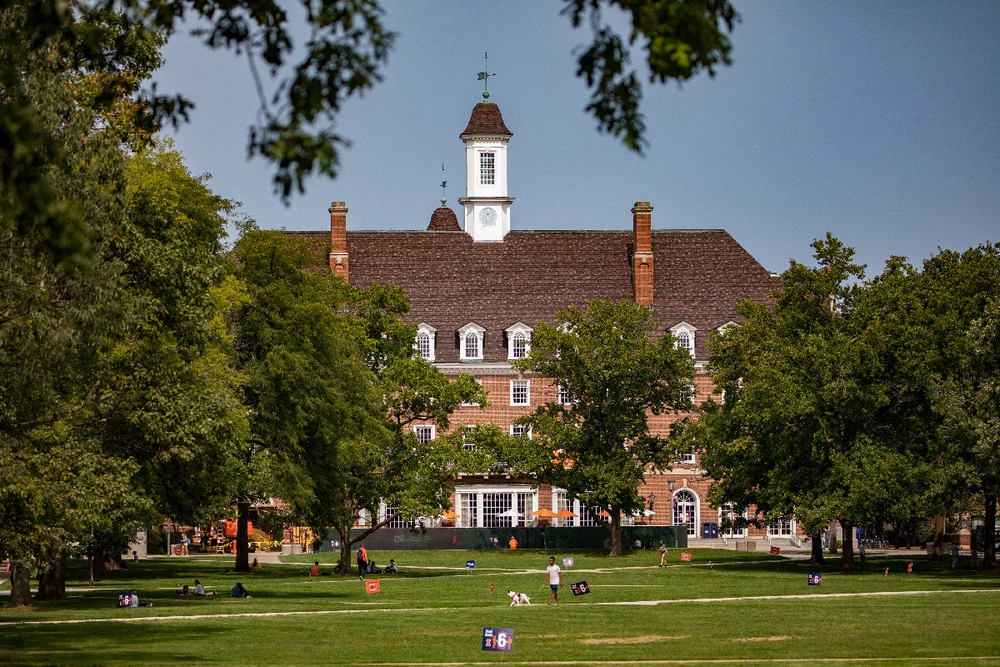
Every year, the Campus Honors Program at the University of Illinois brings together diverse, curious, and engaged students from across campus to create an “overlapping community” of lifelong learners. In recent years, more and more faculty from SLCL have become a part of that effort, thanks in part to director Laurie Johnson.
“Any campus-level program should have solid representation from SLCL, one of the largest schools on campus and home to so many wonderful faculty,” said Johnson, who is also a professor in the Department of Germanic Languages & Literatures.
Creating a varied and diverse curriculum is a mission past CHP director Kim Graber started, one Johnson is now carrying forward.
“SLCL had some representation in the curriculum, but I have expanded that, as integrating more SLCL courses means strengthening the presence of the humanities and of intercultural studies in the CHP,” said Johnson.
The Campus Honors Program serves approximately 600 undergraduate students, designated Chancellor’s Scholars, from all colleges and a wide variety of departments and majors. Courses vary from semester to semester, but they’re typically seminar-style classes limited to 20 students.
Even within the humanities, there’s a big variety in course content. Current CHP courses taught by SLCL faculty include Health and wellness in the Latinx community (Ann Abbott, Spanish & Portuguese); French food for thought (Daniel Maroun, French & Italian); Introduction to Greek and Roman theater (Ariana Traill, classics); Literatures of the Islamic world (Eric Calderwood, comparative & world literature); English across cultures (Rakesh Bhatt, linguistics); Archaeology of Italy (Brett Kaufman, classics); and Hittite language and culture (Ryan Shosted, linguistics).
By leading these courses, SLCL faculty are helping students explore topics and fields outside of their own majors and learn about diverse perspectives. Sometimes they’re even helping them engage with content that would typically require mastery of another language.
Spanish professor Ann Abbott is a good example of that. She’s teaching Health and wellness in the Latinx community this year for the CHP, a course she normally teaches in Spanish.
“Sometimes I think of the SLCL building as an oasis for the study of global languages and cultures on our campus. But when SLCL faculty participate in the CHP — a highly selective, campus-wide program — we take our expertise and insights outside of our oasis and bring it to a wider public,” said Abbott. “Teaching in English means that our knowledge and viewpoints can reach students who would never have enrolled in a course taught in another language.”
Other times, the emphasis of the course is changed, rather than the language.
“[Hittite language and culture] was originally taught in linguistics, where the emphasis was mostly on grammar and cuneiform writing. Since then, I have modified it to emphasize elements of Hittite culture, history, and religion. Specialized linguistic skills are no longer as central to the course, though they are still introduced as analytical tools for working with authentic Hittite texts,” said professor Ryan Shosted.
The CHP doesn’t just help students explore new fields. It also helps faculty reach students they may never have otherwise encountered.
“It’s an opportunity to get students from all over campus and show them my passion in the hopes it might foster their own,” said professor Daniel Maroun, who teaches French food for thought. “I want the course to be an exciting intellectual hobby for students who might have never looked at food in this way.”
While there’s been positive momentum, Johnson said efforts to recruit more diverse and underrepresented faculty from various colleges are ongoing.
“It’s important to have a diversity of topics, cultures, and perspectives represented in the CHP curriculum. SLCL and its faculty are crucial contributors to that mission.”
Dania De La Hoya Rojas